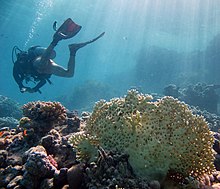
Recreational dive sites are specific places that recreational scuba divers go to enjoy the underwater environment or for training purposes. They include technical diving sites beyond the range generally accepted for recreational diving. In this context all diving done for recreational purposes is included. Professional diving tends to be done where the job is, and with the exception of diver training and leading groups of recreational divers, does not generally occur at specific sites chosen for their easy access, pleasant conditions or interesting features.
Recreational dive sites may be found in a wide range of bodies of water, and may be popular for various reasons, including accessibility, biodiversity, spectacular topography, historical or cultural interest and artifacts (such as shipwrecks), and water clarity. Tropical waters of high biodiversity and colourful sea life are popular recreational diving tourism destinations. South-east Asia, the Caribbean islands, the Red Sea and the Great Barrier Reef of Australia are regions where the clear, warm, waters, reasonably predictable conditions and colourful and diverse sea life have made recreational diving an economically important tourist industry.
Recreational divers may accept a relatively high level of risk to dive at a site perceived to be of special interest. Wreck diving and cave diving have their adherents, and enthusiasts will endure considerable hardship, risk and expense to visit caves and wrecks where few have been before. Some sites are popular almost exclusively for their convenience for training and practice of skills, such as flooded quarries. They are generally found where more interesting and pleasant diving is not locally available, or may only be accessible when weather or water conditions permit.
While divers may choose to get into the water at any arbitrary place that seems like a good idea at the time, a popular recreational dive site will usually be named, and a geographical position identified and recorded, describing the site with enough accuracy to recognise it, and hopefully, find it again.